|
|
|
Sort Order |
|
|
|
Items / Page
|
|
|
|
|
|
|
| Srl | Item |
| 1 |
ID:
169604
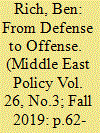

|
|
|
|
|
| Summary/Abstract |
Since the 2015 ascension of King Salman bin Abdulaziz, the Saudi state has displayed growing discontinuity with trends in its pursuit of national security. Over the past four years, the kingdom has shifted from being a source of comparative stability and continuity in the Persian Gulf security equation to a disposition that is disruptive to that system. Having initiated a series of destabilizing crises throughout the Middle East, the Saudi pursuit of external security appears no longer defined by the predictability that has been its hallmark since its inception. Instead, it appears increasingly characterized by unpredictable aggressiveness. As one veteran Saudi analyst has argued, anticipating the kingdom's next foreign‐policy move has become more challenging than Soviet watching during the height of the Cold War.
|
|
|
|
|
|
|
|
|
|
|
|
|
|
|
|
| 2 |
ID:
169607
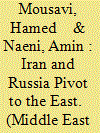

|
|
|
|
|
| Summary/Abstract |
Iran and Russia are cooperating on the construction of the Bushehr nuclear power plant as well as others. Iran is a major importer of Russian arms, including the S‐300 missile system. Efforts to keep Bashar al‐Assad in power in Syria have led to unprecedented military and intelligence cooperation between the two countries. They were also recently able to reach an agreement on rights to the Caspian Sea after many years of strife. Moreover, trade between the two has increased in the wake of Western sanctions. Russia has become disillusioned about better relations with the West following unsuccessful attempts to improve them during the tenure of Dmitry Medvedev. Iran is coming to a similar realization with the collapse of the nuclear deal (JCPOA). The two countries also share the goal of limiting U.S. global influence.
|
|
|
|
|
|
|
|
|
|
|
|
|
|
|
|
| 3 |
ID:
169601


|
|
|
|
|
| Summary/Abstract |
We are still coming to understand the impact of Jamal Khashoggi's murder. I considered him a friend. No one deserves to die as he apparently did. The incident is in every respect repellent.
|
|
|
|
|
|
|
|
|
|
|
|
|
|
|
|
| 4 |
ID:
169605
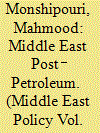

|
|
|
|
|
| Summary/Abstract |
Envisioning a post‐oil era leaves an ominous uncertainty hanging over the ruling elites in the Middle East and North Africa (MENA), particularly in the oil‐exporting countries. What is the proper strategy for a transition to a more reliable and sustainable economy? While the resource curse is widely regarded as having contributed to the underdevelopment of the region, recent studies demonstrate that oil wealth in and of itself provides a less compelling explanation for economic decline. Oil wealth does not necessarily weaken state institutions; rather, a rentier economy requires governments to perform remarkably well in order to effectively manage financial gains.1 What will happen to “the viability of these countries if they can no longer rely on oil and gas exports, or if they run out?”2 The global trend toward alternatives to fossil fuels is likely to undermine oil‐dependent MENA economies, and many countries have come to realize that the move to low‐carbon‐emission energy sources is inevitable.
|
|
|
|
|
|
|
|
|
|
|
|
|
|
|
|
| 5 |
ID:
169606


|
|
|
|
|
| Summary/Abstract |
Iran's political landscape witnessed a month‐long series of public protests from the final days of 2017 until the end of January 2018. According to the interior minister, an unprecedented number of cities — more than 100 in total — bore witness to these protests.1 Although the ruling clergy managed to stabilize the situation, the protests have continued, albeit in a sporadic way, up until the present. While the chorus of voices seeking regime change has become louder, reform discourse is earning scant popularity in the political lexicon of the country. This situation is attributable partly to the hostile approach adopted by the Trump administration in abandoning the joint nuclear deal with Iran and reintroducing sanctions. Additionally, the current U.S. administration has increased its ties with, and support for, the Iranian opposition groups that seek regime change. However, external factors offer only a partial explanation for the recent political upheaval.
|
|
|
|
|
|
|
|
|
|
|
|
|
|
|
|
| 6 |
ID:
169602
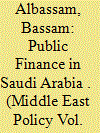

|
|
|
|
|
| Summary/Abstract |
Government management of public funds plays a major role in a country's development process. A well‐managed financial system supports public‐service quality and equity, enhances the efficiency and effectiveness of public programs and government work, and limits corruption. In addition, international donors (e.g., the IMF and World Bank) seek the best use of the financial and nonfinancial aid they provide to countries in need; thus, they support effective management of public funds. A budgeting system is considered a keystone for any public financial system. One could argue that, public financial management (PFM) — a government's revenues, expenditures and budgeting process — is the primary driver of all activities in a given country, regardless of its political, cultural and economic systems. Additionally, the manner in which the public financial system is managed has a significant impact on all sectors — public, private and nonprofit.
|
|
|
|
|
|
|
|
|
|
|
|
|
|
|
|
| 7 |
ID:
169603


|
|
|
|
|
| Summary/Abstract |
The purpose of this analysis is to critically examine the relationship between the al‐sahwa al‐islamiyya (Islamic Awakening) movement and the Saudi state following the 2011 Arab uprisings. Typically referred to as the “Sahwa,” this organization is a hybrid of Wahhabi Islamic theology and the political ideology of the Muslim Brotherhood. This research argues that the Sahwa and Sahwa‐like or Sahwa‐linked groups and individuals serve as one of the greatest legitimate threats to the Saudi government's monopoly over the domestic political and religious spheres. While the history of the relationship between the Sahwa and the Saudi state comprises both cooptation and repression, the period following the Arab uprisings has witnessed a dramatic increase in the latter. This is particularly true of the years dominated by King Salman and Crown Prince Mohammed bin Salman (MBS). Recent arrests coupled with the Saudi government's policies and rhetoric demonstrate that the issue of the Sahwa remains a challenge to its authority. This work also argues that domestic political concerns and regional geopolitical developments have converged in such a manner that they should be viewed as interconnected strategic theaters.
|
|
|
|
|
|
|
|
|
|
|
|
|
|
|
|
| 8 |
ID:
169609


|
|
|
|
|
| Summary/Abstract |
In 1992, with the so‐called Basic Laws, Israel was defined as a “Jewish and democratic state.” But according to Dorit Beinisch,1 there is still no consensus among the Israeli secular (hiloni) and religious (dati) public as to what it means to be Jewish and democratic, and nobody knows how to balance the two.2 In fact, many have wondered to what extent the Jewish religion is compatible with the tenets of democracy. By turning to the Torah and the Talmud, it is possible to quote passages that give the most varied and dissimilar answers: from “if Israel is Jewish, it cannot be democratic,” to “Israel can be democratic precisely because it is Jewish,” et cetera.3 Compulsory military service in Israel represents an emblematic case to illustrate, with some depth, the tensions, scope and nuances of this critical discussion, inasmuch as the notions of secularization and democracy converge intimately here.
|
|
|
|
|
|
|
|
|
|
|
|
|
|
|
|
| 9 |
ID:
169608
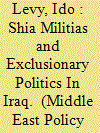

|
|
|
|
|
| Summary/Abstract |
Following the May 12, 2018, parliamentary elections in Iraq, the lists of two prominent militia heads have emerged victorious. The Saairoon Alliance came in first, with 54 of the 329 seats, while the Fatah Alliance took second, with 47. Muqtada as‐Sadr, the Shia cleric and leader of the militia Saraya as‐Salam, and Hadi al‐Amiri, commander of the Badr Organization, head Saairoon and Fatah, respectively.1 These results reflect the widespread support the militias of al‐Hashd ash‐Shaabi, the Popular Mobilization Units (PMUs), have accumulated in their efforts against the Islamic State (IS) terrorist organization. Some PMUs want to assist the military in restoring the government's full control over Iraqi territory and even be incorporated into the military and police. Others receive support from Iran and openly proclaim loyalty to its supreme leader.
|
|
|
|
|
|
|
|
|
|
|
|
|
|
|
|
| 10 |
ID:
169600


|
|
|
|
|
|
|
|